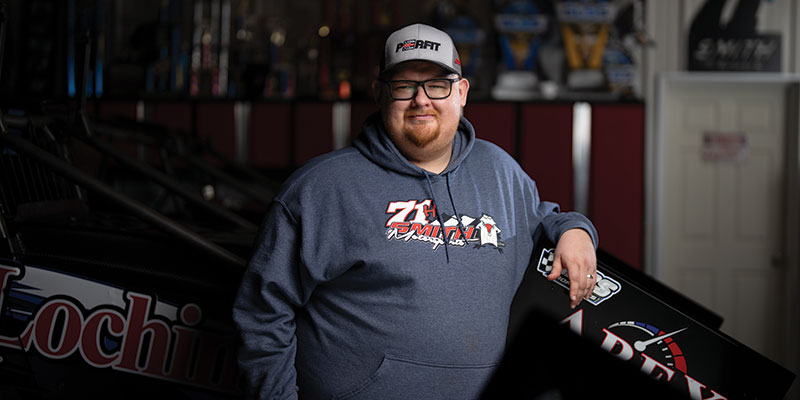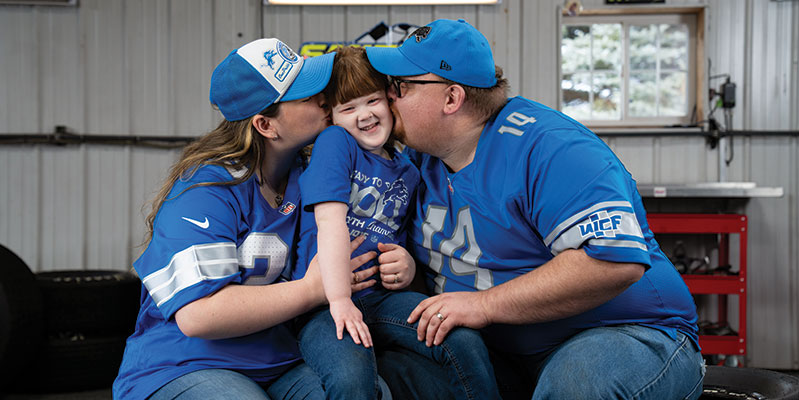Driven to Help: Testicular cancer patient shares encouragement
by Tara Roberts

Zach Hiser
Photo: Erica Reist Bass
With the short-track racing community supporting his journey, testicular cancer patient Zach Hiser encourages fellow fans to get help if they have symptoms
Fans of short-track auto racing like to say that “racing takes balls.” Zach Hiser knows that facing testicular cancer does too.
After he was diagnosed at age 29, Zach, who works in short-track racing media, decided to adopt #RacingTakesBalls as a slogan in his mission to encourage other young men who love racing to pay attention to their health.
“Now it means something. Now it means doing your examination in the shower, or paying attention to your body when you have long-term back pain or you have some discomfort in that region,” Zach says. “If something just ain't right, you think about that slogan.”
Noticing the Signs
Zach’s own cancer journey began with that feeling that “something just ain’t right.”
When he started to feel ill at work one day in May 2024, he texted his wife, Becca, and asked if she thought he needed to go to the doctor. They decided he should head to the hospital if he still didn’t feel right after he got home. That evening, after recording a racing podcast, he went to the emergency room.
A nurse candidly told him he either had an infection or cancer, and a urologist confirmed days later that it was testicular cancer. Zach had surgery to remove his testicle on May 30, 2024.
Analysis revealed that Zach had non-seminoma testicular cancer, which has several subtypes that often appear together in a tumor. Some of Zach’s cancer cells were embryonal carcinoma, which can metastasize from the testicle to the abdominal lymph nodes.
Scans showed that Zach’s cancer had spread. At Rogel’s Urologic Oncology Clinic, under the care of Zachery Reichert, M.D., Ph.D., he underwent a nine-week chemotherapy regimen in summer 2024.
To cope, Zach decided to share his experience on social media, which helped him find encouragement and purpose.
“If I was only doing this for me, I think it would’ve been a lot harder,” he says. “But I realized that I’m doing this for my wife, doing this for my daughter, and doing this for thousands of people who, in my mind, need to see another man go through this, and need to realize that it’s worth it for them to go down the same journey, if they need to.”
A Tight-Knit Community
Zach is “a small-town Michigan boy, born and raised.” He attended Jonesville Community Schools and now lives in nearby Quincy—about 90 minutes outside of Ann Arbor—with Becca, who is his high school sweetheart and wife of nearly nine years, and their daughter, Rosalee, 5.
He’s open, enthusiastic and eager to share the things he loves: his family, his community, his Christian faith, the Detroit Lions. And short-track racing.
Racing has been an essential part of Zach’s life since he got behind the wheel at age 10. After competing for about 12 seasons, he switched gears, picking up a microphone to announce races instead.
Since then, he’s built a multifaceted media career at the heart of the Midwest short-track scene.
He founded Horsepower Happenings, a motorsports media business, in 2018, which he continues to run after another company purchased it. He’s media director at Champion Racing Association, handling everything from press releases to social media posts to coordinating race day broadcasts. In November 2024, he was promoted to general manager for the Great Lakes Super Sprints, a dirt-track racing series across Michigan, Ohio, Indiana and Ontario.
Short-track is also called “grassroots racing.” Zach describes it as similar to minor-league baseball, and it forms the foundation for big brands like NASCAR and Formula One. The racers are people with day jobs who dedicate their free time—and many hours of their lives—to the sport.
“It’s 40 hours a week at your nine-to-five, and then another 30 hours a week in the garage getting the car ready to go for Friday and Saturday nights,” Zach says. “It's blood, sweat and tears. It's unrivaled passion. These folks eat, sleep and breathe short-track racing.”
This dedication builds a loyal and caring community among racers and fans.
“These are competitors who, on the racetrack, want nothing more than to beat the other person. But if that other person wrecks their car, they will help them rebuild it in the pits so that they can be back out there to race with them that night,” Zach says.
The community rallied for Zach after his diagnosis. “Helmet passes” are regular features of race day, when drivers go into the grandstands with their racing helmets to raise money for people and organizations in need. Before, Zach had passed his own helmet around as a racer and announced fundraisers, but he was overwhelmed when the community raised thousands of dollars for him when he needed it most.
“It was so different to be on the receiving end of several helmet passes, and feeling that love and feeling that support,” he says.
Jonesville Community Schools also turned out for Zach, who is the football and basketball announcer at Jonesville High School when his schedule allows. The school donated more than $8,000 to the Hiser family from a cancer fundraiser at a football game.
“Anytime that I'm there in the gymnasium, a week doesn't go by where somebody doesn't ask me how my journey is going,” he says.
The support has been about more than money, he says. Donations have paid for Zach’s gas for trips to Ann Arbor and made sure his daughter has a nice Christmas and birthday. He’s felt comforted by hot meals for his family and boosted by texts, phone calls and emails checking in on him.
His family has embraced the help from their community while supporting Zach too. His parents and in-laws, who also live in Michigan, cared for Rosalee while Zach was at appointments. Becca stayed on top of bills, managed insurance and took time off work to be with him almost every time he went to Ann Arbor for chemotherapy.

Zach Hiser with his wife and daughter
Photo: Erica Reist Bass
Sharing His Message
While so many people were supporting him, Zach said he felt called by God to help others. He was inspired by the memory of his grandmother, Deborah Lynn Hiser, who died suddenly just two hours after Zach learned he likely had cancer. She believed and reminded her family that God could be present anywhere.
“I have cancer, which obviously it's a scary thing, and people handle things differently,” Zach says. “But for me and my faith, I look at this as, ‘What am I supposed to do with this?’”
He realized he had the perfect audience among short-track racing fans, many of whom are between 18 and 35, the age range at which testicular cancer most often occurs. Reichert notes that another 35% of cases arise in people between 35 and 55.
Zach started making #RacingTakesBalls decals and sharing them with drivers. The decals were a hit, including among women racers like sprint-car drivers Kelsey Ivy Mange and Abby Hohlbein, who sported the decals on their cars throughout the recent season.
Zach’s openness about his own journey has helped spread his message. He’s discovered that men will come up to him and ask him what symptoms he had, what his surgery was like and how his life has changed—or share that they have seen or need to see a doctor themselves.
“Men aren't comfortable having those conversations on a regular basis with just anybody, and so I take a lot of pride, and I feel a responsibility to be willing to talk to these individuals,” he says.
Once, a man who had testicular cancer symptoms saw one of Zach’s videos online and decided to get checked. He was diagnosed with cancer and now keeps in touch with Zach over text .
Reichert says messages like Zach’s are important for encouraging people to pay attention to early symptoms of testicular cancer.
“A big challenge we have with testicular cancer is awareness,” he says. “The age groups that get this cancer, which tends to be younger males, tend not to have consistent medical care. They're not seeing doctors routinely, or they may not even have a doctor established. They sometimes also can be between insurances. If they have a lump or a mass, they tend to ignore it, thinking it's just going to go away.”
This leads to people being diagnosed when they have later-stage cancer, which makes them more likely to need chemotherapy, more surgeries and other treatment.
Physicians spread the word about testicular cancer, Reichert says, but a peer like Zach has the chance to reach young men more effectively.
“I think that’s a great gift back to the community,” Reichert says. “Hopefully, then, we don’t have as many problems with other men in the future.”
Zach has broadened his message to cover men’s health in general, encouraging men to prioritize their health, pay attention to symptoms and listen to their support systems—like he did.
“When your wife says that you should probably go see a doctor, you should probably go see a doctor,” he says with a laugh.
Continuing the Journey
Zach’s cancer journey is ongoing. In late March, he had surgery to remove a lymph node for additional testing.
Zach says he’s been encouraged and comforted by Reichert, his surgeon, Udit Singhal, M.D., and the caring and dedicated nursing staff at Rogel. He already had a positive relationship with University of Michigan Health—his daughter was born with a cleft palate that was repaired by doctors at C.S. Mott Children’s Hospital—and his own experience cemented that trust.
“Anybody that I see that's going to University of Michigan Health, I tell them, you are going to be thrilled with your care,” he says.
When his cancer journey is over. Zach plans to amp up his #RacingTakesBalls campaign with hats, T-shirts and racetrack events, using any funds left over from the donations he’s received to help spread awareness.
In the meantime, he continues to tell his story. Whenever anyone has tried to say their own problems don’t matter compared to his cancer, Zach reminds them that everyone has their own battles.
And he wants to be part of helping others face those battles, the way so many people have stood beside him.
“If anybody had to go through cancer, I would hope and pray that they could go through it with the support that I have gotten,” he says.
Rogel offers Spiritual Care services. To consult with a chaplain, call 877-907-0859.
Continue reading Spring 2025 issue of Thrive. Or, download and print the issue.
